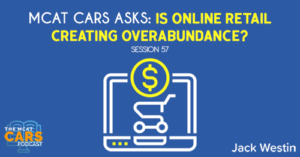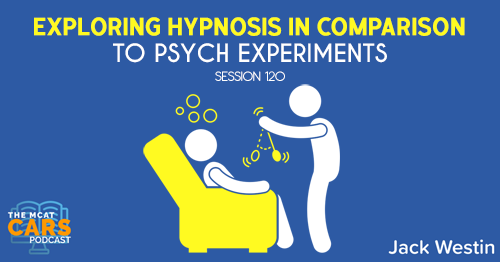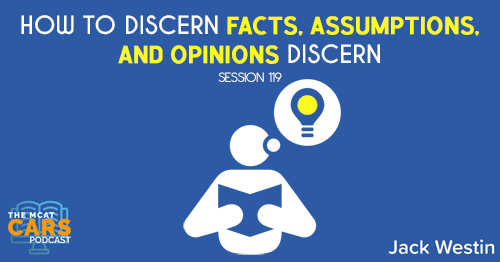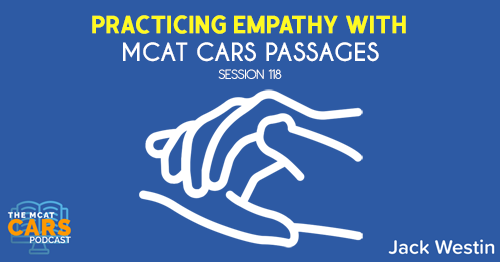Apple Podcasts | Google Podcasts

Session 57
Follow along with the practice passage featured in this episode. We’ll ask: do online retailers create more variety at the expense of value?
Jack Westin joins us for another breakdown of CARS passage to help you get the score that you want on your CARS section and on the MCAT. Sign up for Jack’s free daily CARS passages.
Listen to this podcast episode with the player above, or keep reading for the highlights and takeaway points.
Link to article:
https://www.theatlantic.com/health/archive/2019/05/too-many-options/590185/
In theory, Amazon is a site meant to serve the needs of humans. The mega-retailer’s boundless inventory gives people easy access to household supplies and other everyday products that are rarely fun to shop for. Most people probably aren’t eager to buy clothes hangers, for instance. They just want to have hangers when they need them.
But when you type hangers into Amazon’s search box, the mega-retailer delivers “over 200,000” options. On the first page of results, half are nearly identical velvet hangers, and most of the rest are nearly identical plastic. They don’t vary much by price, and almost all of the listings in the first few pages of results have hundreds or thousands of reviews that average out to ratings between four and five stars. Even if you have very specific hanger needs and preferences, there’s no obvious choice. There are just choices.
The phenomenon repeats for almost all of the everyday objects Amazon carries: phone chargers, water bottles, flat-panel televisions. And it’s not just Amazon. The global-manufacturing apparatus now has the capacity to churn out near-endless stuff. The industry’s output has ballooned 75 percent since 2007 to $35 trillion, according to one analysis, and millions of livelihoods depend on its continued growth.
Over that same period of time, Amazon’s success has pushed retailers such as Walmart and Target to carry even more stuff—especially online—and to get that stuff to shoppers even faster. The internet-shopping boom has spawned an excess-stuff economy, in which retailers such as Overstock.com buy up extra product from full-price retailers. In the case of drop shipment, websites don’t even need to have stuff to sell it: Wayfair, for example, lists thousands of products in scores of categories, but keeps almost no inventory. Instead, manufacturers ship directly to consumers, which helps keep stuff prices down.
Seeing this ever-expanding variety and choice as advantageous to consumers is tempting. The economic theory that governs many Americans’ understanding of consumer choice posits that a free, competitive market should drive down prices on the best-quality stuff. But in the arms race to sell as many sandwich bags or beach towels as possible, a problem has become clear: Variety isn’t infinitely valuable.
[01:20] Some General Tips and Strategies
Just embrace it as you’re about to learn something new. See things from a different perspective on something you probably wouldn’t have thought about on your own. So listen to the author.
'If you're going to be a doctor, be a listener.'Click To Tweet[02:05] Paragraph 1, Sentence 1
In theory, Amazon is a site meant to serve the needs of humans.
Jack says:
The author is talking about the site, Amazon, and how it serves the needs of humans.
[02:33] Paragraph 1, Sentence 2
The mega-retailer’s boundless inventory gives people easy access to household supplies and other everyday products that are rarely fun to shop for.
Jack says:
The author is describing what Amazon is as a mega-retailer.
[02:58] Paragraph 1, Sentence 3
Most people probably aren’t eager to buy clothes hangers, for instance.
Jack says:
It’s an example of what we’re not eager to shop for.
[03:08] Paragraph 1, Sentence 4
They just want to have hangers when they need them.
Jack says:
Customers what their orders to be delivered fast. So the first paragraph is about Amazon, what it’s about, and the things we don’t want to be shopping for.
[04:02] Paragraph 2, Sentence 1
But when you type hangers into Amazon’s search box, the mega-retailer delivers “over 200,000” options.
Jack says:
The author is painting a picture of how vast Amazon is.
[04:29] Paragraph 2, Sentence 2
On the first page of results, half are nearly identical velvet hangers, and most of the rest are nearly identical plastic.
Jack says:
The author is describing the overabundance at Amazon.
[04:47] Paragraph 2, Sentence 3
They don’t vary much by price, and almost all of the listings in the first few pages of results have hundreds or thousands of reviews that average out to ratings between four and five stars.
Jack says:
Based on what we’ve read so far, we could go down this path of thinking that Amazon is a frustrating place to shop. But the author is not really saying that at this point.
This is what most students have a problem with when they begin to bring in their bias. Maybe an overabundance is a good thing. We have to read on because so far, we haven’t seen any sense of frustration from the author yet.
When you think too much, you’re going to mess up. Hold back and stick to what the author is saying. It’s a skill and it takes to objectively read things like this.
'The big problem students have is when they bring in their bias.'Click To Tweet[06:24] Paragraph 2, Sentences 4-5
Even if you have very specific hanger needs and preferences, there’s no obvious choice. There are just choices.
Jack says:
The author is saying there are choices. This paragraph tells us that if you’re searching for something on Amazon, you’re going to be given lots of options without really anything specific. Whether that’s a good thing or a bad thing, we still don’t know at this point.
[07:12] Paragraph 3, Sentences 1-2
The phenomenon repeats for almost all of the everyday objects Amazon carries: phone chargers, water bottles, flat-panel televisions. And it’s not just Amazon.
Jack says:
The author is giving other examples of where this overabundance of choices comes from. And it’s not just Amazon that does this.
[07:46] Paragraph 3, Sentence 3
The global-manufacturing apparatus now has the capacity to churn out near-endless stuff.
Jack says:
The author is saying we can just make lots of stuff, which is the cause of this. There’s nothing negative yet. It’s explaining the situation.
[08:13] Paragraph 3, Sentence 4
The industry’s output has ballooned 75 percent since 2007 to $35 trillion, according to one analysis, and millions of livelihoods depend on its continued growth.
Jack says:
The author is talking about how a lot of people depend on Amazon’s continued growth. This may raise some flags. But we don’t know yet.
[09:01] Paragraph 4, Sentence 1
Over that same period of time, Amazon’s success has pushed retailers such as Walmart and Target to carry even more stuff—especially online—and to get that stuff to shoppers even faster.
Jack says:
The author is bringing up Walmart and Target and painting a picture of competition.
[09:31] Paragraph 4, Sentence 2
The internet-shopping boom has spawned an excess-stuff economy, in which retailers such as Overstock.com buy up extra product from full-price retailers.
Jack says:
Because of all this internet shopping, we have other companies that sell more stuff. A lot of things are being sold.
[10:01] Paragraph 4, Sentence 3
In the case of drop shipment, websites don’t even need to have stuff to sell it: Wayfair, for example, lists thousands of products in scores of categories, but keeps almost no inventory.
Jack says:
The author mentions another company Wayfair that doesn’t even need stuff but just dropships. A lot of students may be confused at this point here thinking that you’re supposed to have a lot of stuff but Wayfair doesn’t have any stuff.
It’s not about having the stuff. The author is trying to say that it’s the perception of having it and the way these organizations are set up for you to buy things. It’s overabundant and going crazy.
[10:53] Paragraph 4, Sentence 4
Instead, manufacturers ship directly to consumers, which helps keep stuff prices down.
Jack says:
This paragraph is about how Walmart and Target and extra stuff being sold to companies like Overstock.com and even companies that don’t have stuff and sell stuff.
[11:30] Paragraph 5, Sentence 1
Seeing this ever-expanding variety and choice as advantageous to consumers is tempting.
Jack says:
The author saying that “seeing” it that way is tempting may suggest that he/she doesn’t see it that way.
[12:10] Paragraph 5, Sentence 2
The economic theory that governs many Americans’ understanding of consumer choice posits that a free, competitive market should drive down prices on the best-quality stuff.
Jack says:
The author defines the economic theory here.
[12:32] Paragraph 5, Sentence 3
But in the arms race to sell as many sandwich bags or beach towels as possible, a problem has become clear: Variety isn’t infinitely valuable.
Jack says:
The whole article is about variety and how we have a lot of stuff. And the author is saying that this overabundance is a problem. This is where they established that.
This massive amount of stuff is causing the normal way of economics to come down and crumble. We don’t know exactly what’s causing it. It could be that there are too many options and we don’t which one is actually quality or not.
But the big point you need to know is that the whole manufacturing economy is providing an overwhelming number of choices and it depends on this excess. This could be a problem.
[14:40] The Main Idea
The main idea here is the excess. So focus on the excess, and not the problem. The problem may come up as the question but it’s not the big point of this passage.
If you actually read the whole article and we didn’t cut anything away, it’s probably going down the route of the problem of this excess.
But based on this passage we’ve read, you should know that it’s all about how we manufacture a lot of excess stuff.
Links:
Link to article:
https://www.theatlantic.com/health/archive/2019/05/too-many-options/590185/
SEARCH SITE
SEARCH SITE
LISTEN FOR FREE











